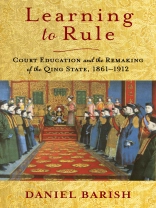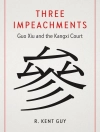In the second half of the nineteenth century, local leaders around the Qing empire attempted to rebuild in the aftermath of domestic rebellion and imperialist aggression. At the same time, the enthronement of a series of children brought the question of reconstruction into the heart of the capital. Chinese scholars, Manchu and Mongolian officials, and writers in the press all competed to have their ideas included in the education of young rulers. Each group hoped to use the power of the emperor—both his functional role within the bureaucracy and his symbolic role as an exemplar for the people—to promote reform.
Daniel Barish explores debates surrounding the education of the final three Qing emperors, showing how imperial curricula became proxy battles for divergent visions of how to restabilize the country. He sheds light on the efforts of rival figures, who drew on China’s dynastic history, Manchu traditions, and the statecraft tools of imperial powers as they sought to remake the state. Barish traces how court education reflected arguments over the introduction of Western learning, the fate of the Manchu Way, the place of women in society, notions of constitutionalism, and emergent conceptions of national identity. He emphasizes how changing ideas of education intersected with a push for a renewed imperial center and national unity, helping create a model of rulership for postimperial regimes. Through the lens of the education of young emperors, Learning to Rule develops a new understanding of the late Qing era and the relationship between the monarchy and the nation in modern China.
Inhaltsverzeichnis
Acknowledgments
Introduction
1. New Forms of Learning for a New Age of Imperial Rule, 1861–1874
2. The Malleability of Youth: Guangxu in the Classroom, 1875–1890
3. Putting Lessons Into Practice: Guangxu on the Throne, 1891–1898
4. Cixi’s Pedagogy: Female Education and Constitutional Governance, 1898–1908
5. Learning to Be a Constitutional Monarch, 1908–1912
Conclusion: Emperor and Nation in Modern China
Character Glossary
Notes
Bibliography
Index
Über den Autor
Daniel Barish is assistant professor of history at Baylor University.












